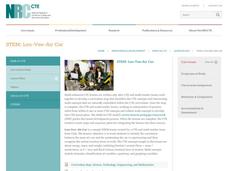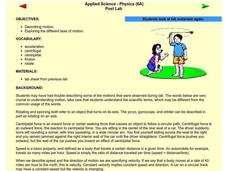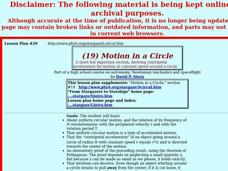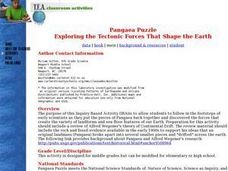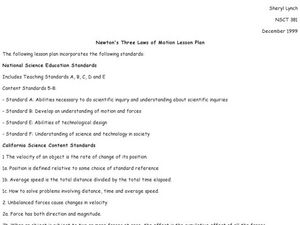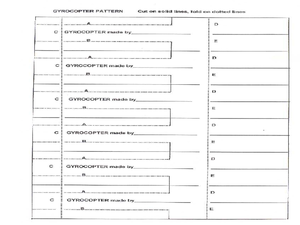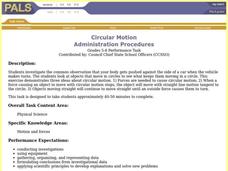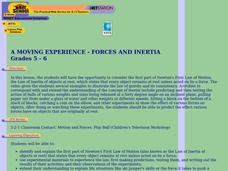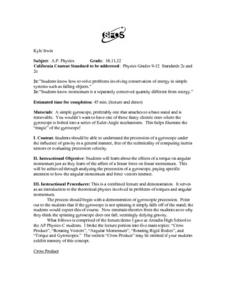Curated OER
Magnetic Force
Students are introduced to the attraction and repulsion of magnetic forces. In groups, they observe how the forces react with different materials and record their data. They develop their own conclusions about the poles of magnets and...
National Research Center for Career and Technical Education
STEM: Lou-Vee Air Car
A comprehensive activity on acceleration awaits your physicists and engineers! Two YouTube videos pique their interest, then sample F=ma problems are worked and graphed. The highlight of the activity is the building of a Lou-Vee air car!...
NASA
Two Versions of Gravity: Newton and Einstein
We have all heard the debate about teaching both theories, but an innovative lesson takes the discussion to a new level. Scholars research and debate Newton's Law of Gravitation versus Einstein's General Theory of...
STEM for Teachers
Tsunami!
How does the depth of an ocean affect the speed of a tsunami's waves? Use Jell-o, graham crackers, and marshmallows to model the effects of an underwater earthquake and its resulting tsunami. The instructional activity includes hands-on...
Curated OER
Laws of Motion
Young scholars explore centrifugal and centripetal force. In this motion lesson, students expand on their knowledge of motion to study velocity, acceleration, and friction. Young scholars examine multiple objects to demonstrate the laws...
Curated OER
MOTION IN A CIRCLE
High schoolers explore uniform circular motion, and the relation of its frequency of N revolutions/sec with the peripheral velocity v and with the rotation period T, and the "centripetal acceleration" of an object.
Curated OER
"Measurement in Motion"
Ninth graders examine the rate of motion and changes in motion using a ramp and a rolling object. They conduct the demonstration, determine the average speed, and describe how a moving object can have zero acceleration and deceleration.
Curated OER
Pangaea Puzzle: Exploring the Tectonic Forces That Shape the Earth
Sixth graders follow in the footsteps of early scientists as they put the pieces of Pangaea back together and discovered the forces that create the variety of landforms and sea-floor features of our Earth.
Curated OER
The Basics: Physical Science
Learners view a video on friction and examine how friction and gravity affect some sports. In this investigative instructional activity students write a paragraph and draw a picture that illustrates how friction and gravity affect...
Curated OER
Motion
Sixth graders read about and study motion. They conduct a lab in which they calculate speed using track records at their school. They graph the results and then invite a guest speaker (an officer from the local police department) who...
Curated OER
Creating Magnetic Forces
Students discover magnetic forces. In this magnetic experiment lesson plan, students explore magnetism. Students conduct experiments and discover magnetic poles and magnetic strength.
Curated OER
Rocket Science
Students conduct an experiment. In this physical science lesson, students learn about Isaac Newton's theory that for every action there is an equal but opposite reaction. Students show this theory by looking at how a rocket is propelled...
Curated OER
Newton's Three Laws of Motion Lesson Plan
Students explore Newton's three laws of motion using a variety of activities. In this physics lesson, students calculate the average speed of a vehicle they constructed using distance and time information. They identify and draw the...
Curated OER
Laws of Motions
Seventh graders explore the Laws of Motion. They define friction and explain the concept of inertia. Students explain what happens when a force is exerted on an object that is in equilibrium. They state the second and third laws of motion.
Curated OER
Gyrocopters-Producing Rotary Motion
Students demonstrate rotary motion by practicing with gyrocopters. In this physics lesson students work in groups to construct a gyrocopter and explore how physics effect it torque and inertia.
Curated OER
Circular Motion
Students investigate circular motion in two different activities. In the first, students observe the path of a rolling marble on a paper plate. In the second, students play a game of catch using a tennis ball inside a plastic bag. ...
Curated OER
Circular Motion
Students research physical science by completing worksheets. In this gravity lesson, students read assigned text regarding the rotation of Earth and the gravitational force caused by the speed of which it rotates. Students complete a...
Curated OER
A Moving Experience - Forces and Inertia
Learners view a video and complete corresponding activities to observe inertia. They observe and predict the effect various forces have on objects.
LABScI
Viscosity: The Fluid Lab
There's more to fluids than meet the eye—they include gases, liquids, and polymers, too! Scholars complete three hands-on activities exploring different properties of fluids. They explore viscosity by measuring the resistance, or...
Curated OER
Gyroscopes in Motion
Physics stars will enjoy learning about the conservation of energy as you demonstrate gyroscope precession. The lecture is broken into five subtopics: cross product, rotating vectors, angular momentum, rotating rigid bodies, and torque...
Curated OER
Sciences Working Together
Learners research articles about science technology and society. In this science and technology lesson, students answer questions about an article they chose. They share what they learned with their peers.
Curated OER
May The Force Be With You
Eighth graders investigate Newton's Laws of Motion. They use the example of a roller coaster for illustration purposes. A force associated with a roller coaster is tested, data graphed, and a conclusion is drawn. They use excel in order...
Curated OER
Flicking With Force
Third graders are introduced to the concept of force and how it acts upon objects. In groups, they are given a ruler, ping-pong ball and golf ball and compare and contrast the force put on the balls when flicked by the ruler. To end...
Curated OER
Forces and Newton's Laws Unit
Students participate in lessons on Forces and Newton's Laws by selecting activities and assignments to complete in a Layer Unit. Students select assignments and activities in the C Level, B Level, and A Level.

